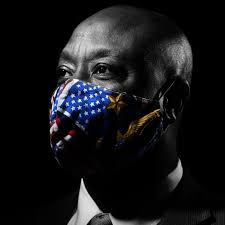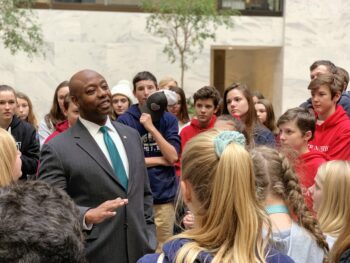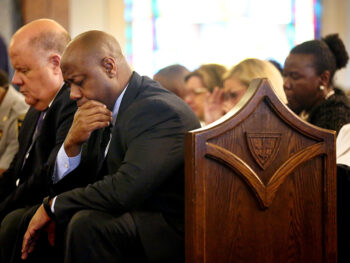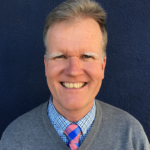 By Michael Ashcraft —
By Michael Ashcraft —
He backed posting the Ten Commandments outside the Charleston City Council before it was declared unconstitutional. He is anti-abortion and opposed to same-sex marriage. He belongs to a large evangelical church in Charleston, formerly serving on its board.
So how did Tim Scott, a black Republican Senator from South Carolina, find himself sitting across the desk of Donald Trump, lecturing the president about racism in America?
His improbable ascent in the political world has God’s fingerprints all over it, because at a fractious time in American life, he’s become a leading conservative voice on racism, straddling the divide between Democrats and Republicans.
By all accounts, his unique position is a tightrope walk.
Senator Scott knew he would be called a sell-out if he remained mum. But he risked incurring the wrath of his president and party if he spoke out.
 “When you’re criticizing the president of the United States, talking about the compromising of moral authority, it can strike a nerve with someone who is not typically a person who listens well in those instances,” he told the Washington Post.
“When you’re criticizing the president of the United States, talking about the compromising of moral authority, it can strike a nerve with someone who is not typically a person who listens well in those instances,” he told the Washington Post.
But Trump listened intently, nodding his head and focusing without distraction. At the end, Trump asked what he could do to help people who might have been offended, and Scott presented him with the idea of setting up Opportunity Zones to facilitate investments in poor neighborhoods. It was incorporated in the Republican tax overhaul of 2017.
“Am I trying to make up for comments made by the president? Definitely not,” Scott says. “What I am trying to do is make the country stronger, and I can do that by working with the president.”
Tim Scott — a strong Christian whose conservative values were formed in a Chick-fil-A — has managed to fill the at-times contradictory roles of ally and agitator with aplomb.
He’s helped pull down Confederate flags and championed police reform legislation as part of the GOP response to George Floyd’s death. (Democrats had criticized his police reform legislation as being “token,” a not-so-veiled racially-charged term that implies skin color must dictate voting patterns. Scott took the floor and with tears in his eyes and recounted how police brutality is real and under-reported. Ultimately, his bill didn’t pass.)
 Scott is a monolithic figure in the Blexit movement, which encourages blacks to actually read the Democratic Party platform and see it if lines up with their values. (Blexit, which stands for “black exit” from the Democratic Party, is a term adapted from Brexit).
Scott is a monolithic figure in the Blexit movement, which encourages blacks to actually read the Democratic Party platform and see it if lines up with their values. (Blexit, which stands for “black exit” from the Democratic Party, is a term adapted from Brexit).
Scott grew up in North Charleston and struggled academically. “When you fail both English and Spanish, they don’t call you bilingual,” he quips. “They call you bi-ignorant.”
His mother was single and worked 16-hour days as a nursing assistant to provide for her three boys. His grandfather became an inspiration for him; the man maintained his dignity through the 40s and 50s when people abused him with the N-word regularly. Grandpa was illiterate but pretended to read the newspaper in front of young Scott to inspire him to study.
Scott loved football and excelled as a high school running back. He hung out at the local Chick-fil-A where the franchise owner took him under wing and became something of a mentor for him. John Moniz was a Christian who encouraged Scott to pursue football and talked extensively about conservative politics.
The love for football ended in a partial scholarship to Presbyterian College. The conservative politics ended in a campaign for the Charleston County Council, which Scott won in a landslide with 80 percent of the vote.
 After a stint in the South Carolina legislature, he launched his long-shot candidacy for the U.S. House of Representatives and trounced Strom Thurmond’s son in the primary. He managed to dodge the controversy that fellow black freshman Allen West courted, put his head down and worked on many issues besides race.
After a stint in the South Carolina legislature, he launched his long-shot candidacy for the U.S. House of Representatives and trounced Strom Thurmond’s son in the primary. He managed to dodge the controversy that fellow black freshman Allen West courted, put his head down and worked on many issues besides race.
For his quiet and effective work, he won the approval of both the Tea Party and the Republican Party, which the Tea Partiers despised.
When Jim DeMint stepped down from the senate in 2013, then-Gov. Nikki Haley tapped Scott to fill the seat.
Scott’s appointment was historic. He was the first African American senator from South Carolina since Reconstruction.
Nevertheless, the New York Times chose to celebrate the feat by race-baiting. Political analyst Adoph Reed in an op-ed said his appointment “obscures the fact that modern Black Republicans have been more tokens than signs of progress.”
Scott didn’t flinch. Detractors didn’t keep him for soldiering on.

Fellow South Carolina resident Rep. Trey Gowdy teased Scott about his new license “USSENATE2.” If he ran a stoplight or played Christian music too loud, Gowdy said, Scott would get pulled over.
“How many times have you been pulled over in the past year?” Scott replied without bitterness. “For me, it’s seven.”
It was a learning experience for Gowdy. “He opened my eyes to things that I could never have seen except for having the eyes of a black man loaned to me.”
In 2015 after a white supremacist killed nine African Americans in Mother Emmanuel AME church in his state, Scott suddenly became more vocal about race relations. ”I had a unique voice on the issue of racism that still exists in the nation and needs to be addressed,” he says.
He joined Haley in taking down the Confederate flag from the South Carolina Statehouse grounds.
He worked with Democratic Senator Cory Booker on a criminal justice reform bill that Trump signed into law in 2018.
His Christian principles guide him constantly. In late night Senate sessions, Scott will pull out his Bible and start studying while Senators are rambling on.
Simply because he’s conservative, fellow black politicians attack.
“I know that my assignment is fraught with controversy and challenges and misunderstanding,” Scott says. “People are more interested in how they feel than in objective perspective. And I’ve got to be okay with that.”
 If you want to know more about a personal relationship with God, go here
If you want to know more about a personal relationship with God, go here
In addition to doing Christian journalism, Michael Ashcraft helps people in California and especially Los Angeles make money, save money and minimize taxes as a financial professional.



